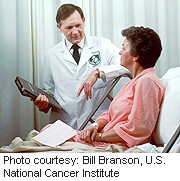- 7 Best Breads for Maintaining Stable Blood Sugar
- Gelatin vs. Collagen: Which is Best for Skin, Nails, and Joints?
- The Long-Term Effects of Daily Turmeric Supplements on Liver Health
- Could Your Grocery Store Meat Be Causing Recurring UTIs?
- Are You Making This Expensive Thermostat Error This Winter?
- Recognizing the Signs of Hypothyroidism
- 10 Strategies to Overcome Insomnia
- Could Artificial Sweeteners Be Aging the Brain Faster?
- Techniques for Soothing Your Nervous System
- Does the Water in Your House Smell Funny? Here’s Why
Chest Pain Less Common in Female Heart Patients: Study


MONDAY, Sept. 16Women with the heart condition known as acute coronary syndrome are less likely to have chest pain than men, which could raise their risk of misdiagnosis, a new study finds.
Acute coronary syndrome, which includes unstable angina and heart attack, is an umbrella term for conditions where blood supply to the heart muscle is suddenly blocked, according to the American Heart Association.
Chest pain is a classic symptom of acute coronary syndrome, but as many as 35 percent of patients do not report chest pain. These patients are more likely to be misdiagnosed in the emergency department and have a higher risk of death compared to patients who report chest pain, the study authors explained.
The researchers looked at about 1,000 patients, aged 55 and younger, who were hospitalized for acute coronary syndrome. The midpoint age of the patients was 49, and 30 percent were women.
Chest pain was reported by 80 percent of patients, but women were more likely than men to not have chest pain, 19 percent versus 13.7 percent.
For both sexes, the most common symptoms besides chest pain were weakness, feeling hot, shortness of breath, cold sweat and pain in the left arm or shoulder. Among patients without chest pain, women had more of these other symptoms than men, according to the study published online Sept. 16 in the journal JAMA Internal Medicine.
“The most significant findings in this study were that chest pain was the most predominant symptom of [acute coronary syndrome] in both men and women 55 years or younger,” regardless of syndrome type, wrote Dr. Nadia Khan, of the University of British Columbia in Vancouver, Canada, and colleagues.
But, they added, “women had a higher likelihood of presenting without chest pain than men. Most women and men who presented without chest pain, however, reported at least one other non-chest pain symptom, such as shortness of breath or weakness.”
The reasons for the sex differences in acute coronary syndrome symptoms was not clear, the study authors noted in a journal news release.
“Our findings indicate that chest pain is the predominant symptom that should direct diagnostic evaluation for [acute coronary syndrome],” the researchers noted. “However, health care providers should still maintain a high degree of suspicion for [acute coronary syndrome] in young patients, particularly women, given that one in five women with diagnosed [acute coronary syndrome] do not report with chest pain.”
More information
The American Heart Association has more about acute coronary syndrome.
Source: HealthDay
Copyright © 2026 HealthDay. All rights reserved.










